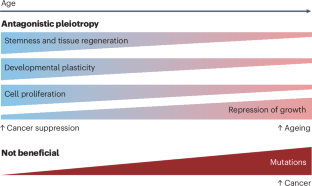癌症和衰老的演变:约束的历史
IF 66.8
1区 医学
Q1 ONCOLOGY
引用次数: 0
摘要
衰老和癌症在动物中无处不在。它们是多细胞生命的基础和本质。尽管如此,不同物种的衰老和癌症发病率差异很大,了解它们的进化和相互作用具有很大的生物学意义。虽然癌症起源于不受控制的细胞增殖,但衰老涉及细胞损失和退化,使它们看似相反但相互关联的过程。因为癌症可以影响年轻人,自然选择将倾向于癌症抗性的进化,而不是在晚年保持健康的过程。因此,我建议物种在减少癌症风险的需要所施加的限制下进化出更长的寿命。抑制癌症的机制,如端粒缩短和细胞衰老,可能通过限制细胞增殖和组织再生而无意中促进衰老。肿瘤抑制的选择也可能影响干细胞老化,并导致成体组织再生能力有限。总体而言,尽管抗癌对长寿的进化至关重要,但肿瘤抑制机制也可能导致与衰老相关的组织退化和功能下降。研究肿瘤抑制过程的进化及其对以后生活的影响之间的权衡可能为衰老过程提供重要的见解。本文章由计算机程序翻译,如有差异,请以英文原文为准。


The evolution of cancer and ageing: a history of constraint
Ageing and cancer are ubiquitous in animals. They are fundamental and generally intrinsic to multicellular life. Nonetheless, ageing and cancer rates vary widely across species and understanding their evolution and interaction is of great biological interest. Although cancer arises from uncontrolled cell proliferation, ageing involves cell loss and degeneration, making them seemingly opposite yet interconnected processes. Because cancer can affect young individuals, natural selection will favour the evolution of cancer resistance over processes that maintain health in later life. As such, I propose that species evolve longer lifespans under the constraints imposed by the need to reduce cancer risk. Mechanisms that suppress cancer, such as telomere shortening and cellular senescence, may inadvertently promote ageing by limiting cell proliferation and tissue regeneration. Selection for tumour suppression may also impact stem cell ageing and contribute to the limited ability of adult tissues to regenerate. Overall, although cancer resistance is essential for the evolution of longevity, tumour suppression mechanisms may also contribute to ageing-related tissue degeneration and functional decline. Studying the trade-offs between the evolution of tumour suppression processes and their impact later in life may provide important insights into ageing processes. In this Perspective, de Magalhães explores the evolutionary relationship between cancer and ageing, proposing that the need to minimize cancer risk early in life may contribute to tissue degeneration later on, representing a trade-off that constrains the evolution of longer lifespans.
求助全文
通过发布文献求助,成功后即可免费获取论文全文。
去求助
来源期刊

Nature Reviews Cancer
医学-肿瘤学
CiteScore
111.90
自引率
0.40%
发文量
97
审稿时长
6-12 weeks
期刊介绍:
Nature Reviews Cancer, a part of the Nature Reviews portfolio of journals, aims to be the premier source of reviews and commentaries for the scientific communities it serves. The correct abbreviation for abstracting and indexing purposes is Nat. Rev. Cancer. The international standard serial numbers (ISSN) for Nature Reviews Cancer are 1474-175X (print) and 1474-1768 (online). Unlike other journals, Nature Reviews Cancer does not have an external editorial board. Instead, all editorial decisions are made by a team of full-time professional editors who are PhD-level scientists. The journal publishes Research Highlights, Comments, Reviews, and Perspectives relevant to cancer researchers, ensuring that the articles reach the widest possible audience due to their broad scope.
 求助内容:
求助内容: 应助结果提醒方式:
应助结果提醒方式:


